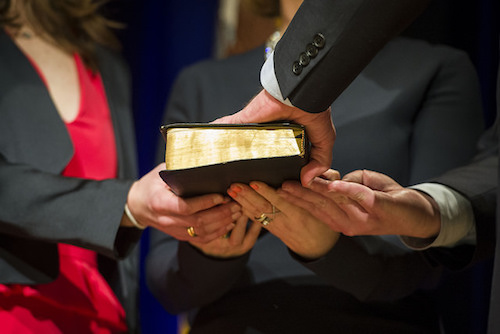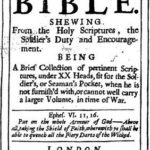We run our website the way we wished the whole internet worked: we provide high quality original content with no ads. We are funded solely by your direct support. Please consider supporting this project.

Jesus Repudiates OT Commands on Oath-Taking: A Response to Paul Copan (#9)
In his critique of Crucifixion of the Warrior God (CWG), Paul Copan argues that “Boyd pushes too hard to make Jesus’ teaching appear more revolutionary than it really is” [italics original]. Whereas I argue that Jesus repudiates aspects of the Old Testament (OT), Copan argues that Jesus merely repudiates wrong applications of the OT, not the OT itself. This is an important point inasmuch as I cite these repudiations as evidence that Jesus placed his own authority above that of the OT as well as evidence that the revelation of God in the crucified Christ radically transforms the meaning that we should find in much of the OT.
Today I will discuss the first teaching of Jesus that I believe repudiates commands in the OT. It concerns Jesus’ prohibition on taking oaths. In his sermon on the mount, Jesus said,
Again, you have heard that it was said to those of ancient times, ‘You shall not swear falsely, but carry out the vows you have made to the Lord.’ But I say to you, Do not swear at all, either by heaven, for it is the throne of God, or by the earth, for it is his footstool, or by Jerusalem, for it is the city of the great King. And do not swear by your head, for you cannot make one hair white or black. Let your word be ‘Yes, Yes’ or ‘No, No’; anything more than this comes from the evil one. (Matthew 5:33-37)
Copan argues that in this teaching “Jesus isn’t disavowing vowing…just casuistic oath-taking that was an escape hatch from truth-telling” [italics original]. In support of this interpretation Copan notes that Jesus was referencing Leviticus 19:12 which says, “And you shall not swear falsely by my name, profaning the name of your God: I am the Lord.”
Copan is correct when he notes that Jesus refers to Leviticus 19:12, and he’s correct that this verse rules out casuistic oaths. But what he seems to miss is that Jesus cites this passage only to contrast his teaching with it. Let’s look at it again. “You have heard that it was said to those of ancient times, ‘You shall not swear falsely, but carry out the vows you have made to the Lord”(Matt 5:33). They had indeed heard this said, for its right there in Leviticus 19:12. But then Jesus goes on to contrast his teaching with this OT passage when he adds: ”But I say to you, Do not swear at all…”
According to Jesus, are we not only supposed to avoid swearing falsely, as when people make casuistic oaths to avoid telling the truth. We are to avoid swearing at all, for anything more than a simple “Yes” and “No,” Jesus says, comes from the evil one” (Matt 5:37). Apparently, any kind of oath-taking, such as those that Leviticus 19:12 (and, we could add, Deuteronomy 23:21) allows, is from the devil.
Not only does Jesus’ teaching repudiate OT passages that allow oath-taking, it repudiates Deuteronomy 6:13 which commands it. “The Lord your God you shall fear; him you shall serve, and by his name alone you shall swear.” The children of Israel at this time were supposed to make oaths by the name of the Lord. Jesus’ teaching to “not swear at all” and to let our “Yes” be “Yes” and our “No” “No,” revokes the portrait of God giving this command and even associates it with a demonic influence.
So, I stand by my claim that aspects of Jesus’ teaching radically contrast with what we find in the OT. And this is why I contend that for all of us who know God as he’s revealed in Jesus’ cross-centered ministry, OT passages such as the ones we’ve just discussed should be understood to bear witness to how far God has always been willing to stoop to bear the sin of his people and to thereby take on an appearance that mirrors that sin, just as he does for the world on Calvary.
Photo by Secretary of Defense on VisualHunt.com
Category: General
Tags: Cruciform Theology, Jesus, New Testament, Old Testament
Topics: Biblical Interpretation
Related Reading

Loving a Twilight Zone God?
David D. Flowers posted this insightful reflection over on his blog about an episode of The Twilight Zone and what it says about some pop views of God. Can we really love a God that exercises this kind of random control just because he can? We can certainly fear a God like this, but can…

Divine Accommodation and the Cross: where Calvin was onto something
Over the last few posts, I’ve been arguing that the cross represents the thematic center of everything Jesus was about. Hence, rather than striving to have a “Christocentric” theology — which is so broad it means next to nothing—we ought to sharpen our focus by striving for a “cruciform” theology. I then offered some suggestions…

Responding to Driscoll’s “Is God a Pacifist?” Part I
I’m sure many of you have read Mark Driscoll’s recent blog titled “Is God a Pacifist?” in which he argues against Christian pacifism. I’ve decided to address this in a series of three posts, not because I think Driscoll’s arguments are particularly noteworthy, but because it provides me with an opportunity to make a case against what I’ve…

Why Did Jesus Curse a Barren Fig Tree?
While no one argues that the NT advocates violence explicitly, many allege that some passages reflect violent attitudes toward outsiders, and especially toward non-believing Jews, while others detect an element of violence in some of Jesus’ teachings and behavior. Some scholars argue that this violent aspect of the NT laid the groundwork for later Christian…

Jesus and Nationalistic Violence
Throughout the Old Testament, we find Israel spoken of as God’s “chosen nation.” The Israelites were to be a nation of priests whom God wanted to use to unite the world under him (Ex 19:6). Since nationalism and violence inevitably go hand in hand, as Jacque Ellul and others have noted, the covenant God made…

Podcast: If the Biblical Prophecies are Flawed, Aren’t Those Prophets ALL False Prophets?
If you want to hear Greg sweat, listen to him work through this really really good question. http://traffic.libsyn.com/askgregboyd/Episode_0200.mp3 Photo by Rex Boggs
